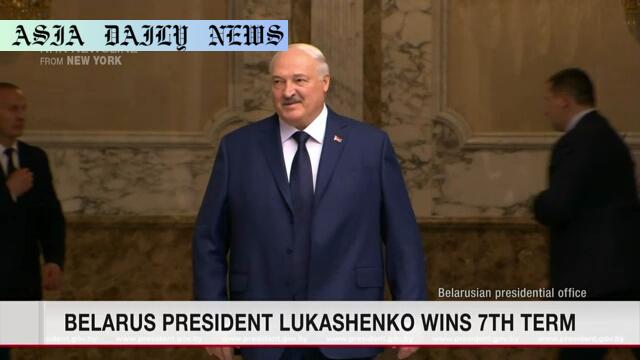Lukashenko Election: Belarus’s President Alexander Lukashenko has won his seventh term as elections face global criticism.
Lukashenko re-elected for a controversial seventh term with 87% votes.
Protests in Poland led by exiled leader Tsikhanouskaya highlight dissent.
EU and critics claim the election was neither free nor fair.
Lukashenko maintains support from Russia amidst mounting opposition.

Lukashenko Secures Seventh Term in Controversial Election
Belarus’s Central Election Commission announced on Monday that President Alexander Lukashenko has won his seventh term in office, securing 86.8% of the vote. The results come amidst accusations of electoral fraud and repression of political dissent within the country. At least five candidates were in the running, but Lukashenko’s victory was widely seen as a foregone conclusion among critics and protesters. The election marks yet another chapter in his nearly three-decade-long rule, earning him the moniker “Europe’s last dictator.”
International and Domestic Criticism of the Election
The election results drew sharp criticism from global and regional leaders. Kaja Kallas, the European Union’s foreign policy chief, strongly condemned the election, calling it a “sham.” She added that the vote neither adhered to democratic standards nor respected international law. The lack of transparency and opposition suppression has fueled widespread skepticism, especially given Belarus’s history of contested elections.
In Belarus, protests that followed the contested 2020 presidential election were notably absent this time. Massive rallies in 2020 challenging Lukashenko’s re-election led to violent crackdowns and forced many dissenters into exile. However, the subdued domestic response this year highlights the increasing risks and constraints faced by protesters under Lukashenko’s authoritarian regime.
Protests in Poland Highlight Continued Discontent
While protests within Belarus were muted, dissenting voices gained prominence abroad. In Warsaw, the capital of Poland, thousands marched in solidarity with the Belarusian opposition. The protest was spearheaded by exiled opposition leader Sviatlana Tsikhanouskaya, who fled Belarus following threats after the contested 2020 election.
Tsikhanouskaya carried a photo of her imprisoned husband during the march. Protesters displayed traditional Belarusian flags, a potent symbol of defiance against Lukashenko’s rule. Speaking to the Polish media, Tsikhanouskaya criticized Lukashenko’s reliance on violence and Russian backing to maintain power. She called his re-election a farce that undermines democracy and basic rights, urging the international community to stand in solidarity with Belarusian citizens.
Lukashenko’s Alliance with Russia
Lukashenko’s longstanding alliance with Russian President Vladimir Putin continues to be a key factor in his reign. Russia provides both political and economic backing, helping Lukashenko weather international sanctions and domestic unrest. Critics argue that Moscow’s support ensures the stability of his authoritarian regime, even as Belarus grows increasingly isolated on the global stage.
The relationship has deepened in recent years, with Belarus playing a significant role in Russia’s geopolitical strategy. This bond complicates efforts by the global democratic community to exert pressure on the Lukashenko government. Many analysts view Belarus as a crucial piece in Russia’s broader agenda, reducing the likelihood of any quick resolution to the crisis.
The Path Forward for the Opposition
Despite the challenges, the Belarusian opposition remains committed to their struggle for democracy. Tsikhanouskaya emphasized that their fight requires sustained international support and collaboration. She believes that the determination of the Belarusian people, when bolstered by democratic allies, could eventually lead to meaningful change. However, overcoming the entrenched power structures of Lukashenko’s regime will require persistent effort.
The muted protests this election cycle might point to diminished hope among citizens inside Belarus. However, the ongoing rallies abroad signify that the desire for change persists. Opposition leaders are likely to continue their efforts to rally global support, with a focus on sanctions and diplomatic action against Lukashenko’s government.
The recent election underscores the critical need for vigilance and action from the international community to support democratic values in Belarus. As long as Lukashenko remains in power, the nation’s potential for freedom and growth remains unrealized.



Commentary
The Troubling Reality of Belarus’s Political Landscape
President Alexander Lukashenko’s seventh-term re-election signals a grim reality for democracy in Belarus. The landslide victory, marred by claims of fraud and suppression, serves as yet another reminder of the authoritarian grip Lukashenko wields over the nation. His reign has been characterized by extensive control over political opposition, muffling dissenting voices within and outside the country. Each election seems to further erode the basic rights of Belarus’s citizens as their calls for transparency and fairness remain unanswered.
The Role of International Community in Belarus’s Struggle
The international community’s role in the Belarusian democratic struggle cannot be overstated. Lukashenko’s strong ties with Russia complicate the situation, as Moscow continues to back his regime financially and politically. This alliance not only stifles domestic dissent but also undermines global efforts to promote democracy in the country. It is essential for democratic nations and organizations to provide unwavering support to opposition leaders like Sviatlana Tsikhanouskaya.
The protests in Poland are an inspiring reminder of the resilience of the Belarusian people, even in the face of adversity. Tsikhanouskaya’s leadership has been a beacon of hope for many, and her calls for international solidarity should not go unheeded. Ensuring the freedom and rights of citizens in Belarus will require coordinated sanctions, strong diplomatic intervention, and unwavering global condemnation of Lukashenko’s actions.
Hope for Belarus Amid the Challenges
Despite the daunting obstacles, there remains hope for Belarus. The muted response within the country this election cycle may reflect the risks of dissent, but it does not indicate the absence of resistance. The spirit of freedom and democracy among Belarus’s citizens continues to thrive in exile and in the hearts of those who long for change. As the global community focuses on supporting these voices, the dream of a democratic Belarus endures.